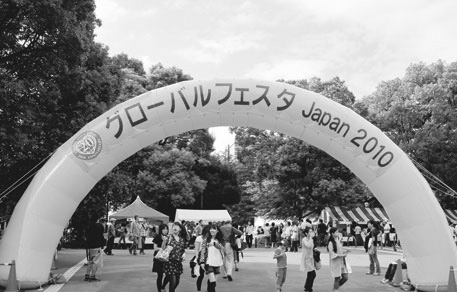Japan's Official Development Assistance White Paper 2010
(4) Information Disclosure and Transmission
As the financial resource for ODA is taxpayers' money, Japan is working to ensure transparency and to disclose and transmit information.
(a) Public Relations and Information Disclosure
MOFA and JICA have each established websites (Note 40) related to ODA in the aim of transmitting accurate information in a timely manner. MOFA also issued the Kokusai Kyoryoku Newspaper (International Cooperation Newspaper) that contained the latest information regarding international cooperation on a monthly basis up until March 2010 (Note 41). The newspapers were distributed to educational institutions, libraries, hospitals, and similar locations around the country. MOFA also publishes an ODA email magazine that includes episodes written by officials on overseas diplomatic missions and JICA related personnel about their actual experiences in the fields.
As part of efforts to promote international cooperation efforts and dialogue with the public, symposiums with Japanese citizens named Kokusai Kyoryoku ni Tsuite Kataro (Let’s Talk about International Cooperation) are held three times per year. MOFA also holds the ODA On-Demand-Delivery Lecture, where MOFA staff visit elementary schools, junior and senior high schools, universities, local governments, NGOs, and similar venues to describe various topics on international cooperation.
Since FY1997, a series of regular programs have been televised for promoting the public’s interest and understanding of international cooperation. In FY2009, ”Chibana Kurara no Chikyu Supporter” (Global Support by Kurara Chibana) was televised by a TV TOKYO affiliate, which showed images of Japanese aid-related personnel who are active in developing countries as well as images of local residents. The show also introduced the current situation in developing countries, the necessity of aid, and the results from Japanese projects.
Global Festa JAPAN is held annually around International Cooperation Day (Note 42) (October 6) as Japan’s largest international cooperation event. Cosponsored by MOFA, JICA, and JANIC (Japan NGO Center for International Cooperation), the event is held on a Saturday and Sunday at Hibiya Park in Tokyo. Over 270 organizations including NGOs, international agencies, and embassies of various countries present exhibits at the festival, and the festival receives about 96,000 visitors.
Following the ”ODA Review Final Report”, Japan will renew its public relations efforts, including systematic visualization of the current status of ODA projects for increasing public understanding and support, and the use of the JICA International Centers in regions all around the country.

(b) Enhancing Dissemination of Information to the International Community
Japan employs various measures to raise awareness overseas about the proactive international contributions made by Japan via ODA. Specifically, Japan has participated in interviews with the local press in addition to offering press releases at signings and handover ceremonies, attaching Japanese flag stickers (in English and Arabic) and the Japanese ODA logo (in English, French, Spanish, Arabic, and Portuguese) to goods supplied through assistance. Japanese overseas diplomatic missions have arranged visits to Japan’s ODA project sites for the local press and created opportunities for the local media to gather information on Japan’s cooperation projects. Furthermore, Japanese embassies disseminate information via various lectures and websites in English and local languages, and create pamphlets for publicity.
Notes:
(40) MOFA: http://www.mofa.go.jp/mofaj/gaiko/oda; JICA: http://www.jica.go.jp
 ; Plaza for International Cooperation http://www.apic.or.jp/plaza.
; Plaza for International Cooperation http://www.apic.or.jp/plaza.
(41) Publication was suspended as of March 2010.
(42) On October 6, 1954, Japan’s participation in the Colombo Plan was given cabinet approval, and economic cooperation began. October 6 was set as International Cooperation Day in 1987, via cabinet approval.
